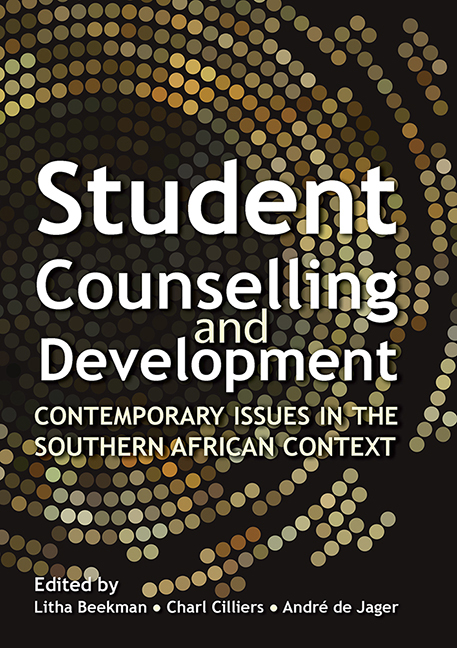Book contents
- Frontmatter
- Contents
- Figures
- Tables
- Preface
- Section 1 Development of Student Counselling and Development in Southern Africa
- Section 2 Theoretical Foundations of Student Counselling and Development in Higher Education
- Section 3 Services and Programmes Provided by Student Counselling and Development Units
- Section 4 Student Counselling and Development For Special Groups
- Section 5 Quality Assurance and Ethical and Professional Issues
- Contributors
- Index
Chapter 13 - Counselling Student Athletes
Published online by Cambridge University Press: 22 February 2020
- Frontmatter
- Contents
- Figures
- Tables
- Preface
- Section 1 Development of Student Counselling and Development in Southern Africa
- Section 2 Theoretical Foundations of Student Counselling and Development in Higher Education
- Section 3 Services and Programmes Provided by Student Counselling and Development Units
- Section 4 Student Counselling and Development For Special Groups
- Section 5 Quality Assurance and Ethical and Professional Issues
- Contributors
- Index
Summary
INTRODUCTION
South African institutions of higher education (HE) have traditionally been a major source of high performance athletes. These institutions not only provide high-level training, development and support for these athletes, but through research and innovation also generate new knowledge and understanding of sporting disciplines and techniques.
These student athletes,1 however, face unique challenges and more pressures than other athletes. Performing well athletically, academically and socially is becoming increasingly difficult as society expects more from athletes, but subsequently also expects more from student athletes in terms of preparing for a career. Societal rewards, as well as punishments, make extreme demands on athletes, as well as on students. Student athletes, therefore, experience these pressures more intensely. The increasing professionalism of sport itself has added a further dimension to the increasing pressure on athletes. For student athletes balancing this professionalism with their preparation for a career in sport, or often for an alternative career, makes performing, coping and general psychological wellbeing so much more complex (Greenspan & Anderson, 1995).
In supporting and developing these student athletes, one of the main disciplines that plays a role, not only as a major science, but also in performance enhancement, psychological injury rehabilitation and general psychological wellbeing of athletes, is the field of sport psychology. Sport psychology, as defined by Rejeski and Brawley (1988, cited in Morris & Summers, 1995, p. 438) is the “educational, scientific and professional contribution of psychology to the promotion, maintenance and enhancement of sport related behaviour”. Gill (2000, p. 4, cited in Weinberg & Gould, 2005) refers to sport and exercise psychology as the “scientific study of people and their behaviour in sport and exercise activities and the practical application of that knowledge”. Sport psychologists identify principles and guidelines that professionals can use to help athletes participate in and benefit from sport and exercise activities. Weinberg and Gould (2005) state that the field of sport psychology has two main objectives: (1) to understand how psychological factors affect an individual's physical performance, and (2) to understand how participation in sport affects a person's psychological development, health and wellbeing.
- Type
- Chapter
- Information
- Student Counselling and DevelopmentContemporary issuesin the Southern African Context, pp. 247 - 256Publisher: University of South AfricaPrint publication year: 2012



